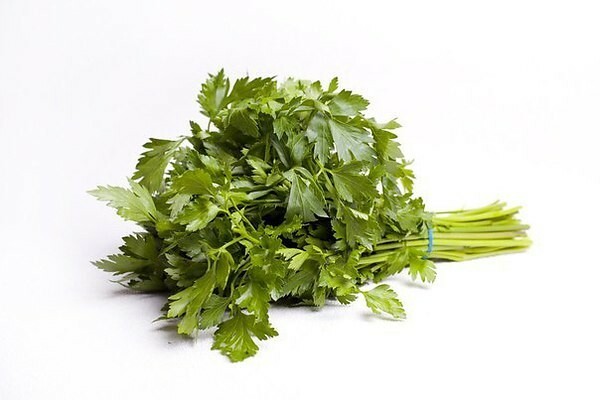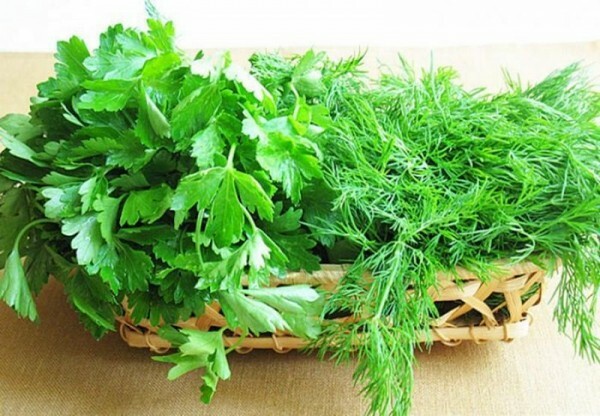Contents:
- Healing vitamin parsley composition
- Parsley composition and energy value
Curly parsley is known to everyone, moreover, it is on our planet for so long that it is difficult to say who first opened it. For example, the ancient world, which we know from the history books, knew it. Parsley was for the Greeks, Egyptians and Romans and a plant for decorating the garden, wreaths, and food, which gave strength, beauty and health. But why such a simple greenery was revered, it is so ordinary? This is a misconception of many, because most do not even know what vitamins are in parsley, and undesirably understate its importance in our lives.

It's interesting! The Romans did not just like parsley, but honored. They gave greens to their gladiators before the battle, then the soldiers became invincible and unusually strong. There are also many beliefs that the sprigs of parsley in the house will relieve the inhabitants of evil forces, diseases, unkind people.
Vitamin A parsley
Vitamin A
We will take the amount from the calculation for 100 grams of greens, as this is a recognized measure. And if we talk about greenery, then this is about one good bundle, which everyone can eat all year round without problems and large material costs. You can grow greenery even on your windowsill, parsley is very unpretentious.

So, vitamin A in the green contains 0.95 mg. Petrushka, though not a record holder for him, but still he is, which means that part of the deficit will be replenished. Why do we need it:
- perfectly helps our skin, makes it smoother, it is more quickly restored after abrasions, acne;
- has a regenerating property;
- has a beneficial effect on our bones, skeleton;
- helps the immune system;
- is useful for vision;
- beneficial effect on the state of the genitourinary system, helps digestion.
For information! Vitamin is also called retinol. You can often hear that it is called carotene, but this is not entirely correct.
Vitamin B1, B2 and B5
We combined these vitamins in parsley, since they contain approximately the same amount - at 0.05 mg. Each of them acts in its own way on the human body. Vitamin B1:
- has a beneficial effect on the nervous system;
- helps to cope with stress, depression;
- is needed by our cardiovascular system.
For information! Vitamin B1 is also called thiamine, it is often prescribed by neurologists with the corresponding diseases of the nervous system.
Vitamin B2:
- is needed for the nervous and digestive system;
- affects the exchange processes, including energy exchange;
- is needed for the skin;
- lack of vitamin B2 affects the eyesight negatively;
- helps tissue repair.
For information! The second name is riboflavin.
Vitamin B5:
- helps in the cleavage of lipids;
- promotes the biosynthesis of neurotransmitters;
- helps in the production of antibodies;
- stimulates the production of a number of necessary hormones;
- has a beneficial effect on tissue repair.
For information! Vitamin B5 in parsley is pantothenic acid. It can easily break down during the processing of products by thermal means.
Vitamin B3
The ingredient is already in a larger quantity in parsley - 16 mg. He gives us the following benefits:
- assists in the absorption of nutrients;
- has a beneficial effect on the absorption of energy from food;
- improves metabolism, carbohydrate metabolism;
- lowers cholesterol;
- is needed for diabetics;
- helps in the production of red blood cells;
- stabilizes the pressure.
For information! Vitamin B3 is called niacin, also it is nicotinic acid.
Vitamin B6
The composition of the greens is about 0.2 mg, and we need it for health, because:
- stimulates metabolic processes;
- assists in the assimilation of acid and proteins;
- has a beneficial effect on the cardiovascular system;
- reduces pressure;
- increases the body's defenses;
- is very important for genetic metabolism;
- stabilizes the nervous system, helps with stress, depression.
For reference! Vitamin B6 also has its second name and it is pyridoxine.
And the last vitamin from this group in parsley is B9.Let's find out why we need it.
Vitamin B9
It is composed of 110 mcg. I think you know the name folic acid more. Women who plan pregnancy or have already become mothers know perfectly well how this vitamin is needed for the future child and the health of the mother. Also folic acid is needed:
- to our skeleton and bones in general;
- digestive system;
- circulatory system;
- to the nervous system, especially important for children, so that they can develop well mentally.
So, now let's move on to the leaders in the composition of parsley, each of which we need, and thanks to the greenery the deficit will be replenished.
Vitamin C
Just imagine the content of vitamin C parsley surpasses many products, but its usefulness and significance is not only lazy. And everyone knows that this is ascorbic acid. Why do we need it:
- increases the defenses of the body, we are less sick;
- stimulates the work of the cardiovascular system, the nervous system, serves the prevention of diabetes, stroke and heart attack;
- is an antioxidant;
- cleans the body of toxins and toxins;
- has a beneficial effect on our skin;
- cleanses the body of viruses, bacteria;
- helps the development of a number of hormones.
Vitamin E
It is also very often heard, for example, from advertisements on television of various cosmetics. All because it is a good helper to our skin and hair. Also, it helps us to be younger, in the composition of parsley vitamin E - 1.6 mg.
It gives our health the following:
- is a powerful antioxidant that helps us not to age, also serves as a preventive measure of atherosclerosis and oncology;
- has a positive effect on the skin, nails, hair;
- reduces the level of harmful cholesterol in the blood;
- helps not to age not only the skin, but also the brain;
- stabilizes the cardiovascular system;
- helper to all people of age.
Vitamin K
And the last vitamin in the composition of parsley, but not in importance. It is in the green - 1.8 mg. Also called lipovitamin, since it consists of a number of components. One of the main functions of this vitamin in parsley is the normalization of the functioning of our circulatory system.
We also need it so that:
- has a beneficial effect on blood coagulability;
- to assist liver function;
- prevent bleeding;
- assist bone tissue;
- does not promote the washing away of calcium in the body, which prevents various diseases, including osteoporosis;
- vitamin perfectly copes with the purification of our body from toxins and carcinogens.
As you can see, such a rich vitamin composition has a simple parsley, but it's not all components, because there are also macro and microcells, acids, fiber or fiber. The use of the latter should also not be underestimated, because cellulose can be contained only in plants, helps the work of our gastrointestinal tract.
It cleans the body of all harmful substances, since it can not be absorbed by the body almost completely, which means that it is simply removed and serves as a purification system. We cease to grow stout, the skin acquires an even and clean appearance, but the energy is more than enough. Fiber is represented by complex carbohydrates or slow ones. They do not harm our figure, but are beneficial. Well, if we started talking about carbohydrates, then it's worth mentioning about parsley BZH, which is spoken by everyone who wants to lose weight and lead a healthy lifestyle.

Parsley composition and energy value
What is BZU?The elementary answer is proteins, fats and carbohydrates. Many women are now counting their calculations, and that men can also count calories as they are fashionable now and it is useful to know for a figure and to fill a deficit. So, in the composition of parsley:
- calories - 47 kcal;
- proteins - 3.7 grams;
- fats - 0.4 grams;
- carbohydrates - 7.6 grams.
We hope you have changed your attitude to simple grass for salad. It should be perceived not as an additive, but as a product that brings benefit and beauty. Health to you!
